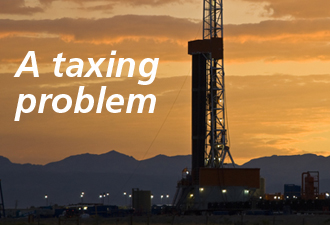Testimony

Marcellus Shale Local Impact Fee
Good evening. I am Elizabeth Stelle, a Policy Analyst for the Commonwealth Foundation. We are Pennsylvania’s free market think that crafts and promotes free-market policies based on guiding principles like limited government and personal responsibility. I would like to thank Representative White and members of the Co-op for the opportunity to discuss a local impact fee on natural gas development.
In 2007, Bradford County, Pennsylvania was a rural, depressed area with high unemployment and little economic opportunity. Fast forward to 2011 where two local hotels under construction are booked solid for two years, sales tax collections have soared and the county now boasts the second lowest unemployment rate in the state, adding 2,500 new jobs in one year-that’s a nearly 10% growth. Even the county court house is benefiting from about a million dollars in recording and copying fees.
Bradford County is no exception, Marcellus Shale development can bring instant prosperity to sleepy communities, but those gains are not without growing pains. The challenge going forward is to assess if communities are being negatively impacted and then identify how to best address those concerns. Local governments are in the best position to see the needs of their communities and they are best qualified to find innovative ways to partner with the industry, versus a one-size-fits fee or tax from Harrisburg.
Unfortunately, the impact fee or severance tax discussion has not focused on the needs of local communities but the need for the industry to pay their “fair share.” What is their fair share? Drilling companies already pay every business tax common to other companies, including the 9.99 percent corporate income tax. Pennsylvania has collected more than $1.2 billion in revenues from these groups since 2006. The figures from 2011 already exceed, by nearly $72 million, the total tax payments made in all of 2010. As of June, 877 of these companies have paid $292.2 million in capital stock/foreign franchise tax, corporate net income tax, sales/use tax and personal income tax employer withholding to the state
The Commonwealth Foundation opposes any new tax on Marcellus Shale drillers that doesn’t directly pay for unaddressed industry impact on the environment and infrastructure. We believe companies should pay for the government they use. But to date, tax and fee proponents have not identified what impacts of drilling are not covered by current taxes, fees and road improvement spending of drilling companies. In fact, a recent analysis by Penn State University found the costs imposed on local governments in Washington County as of 2010 are minimal.
Environmental violations are met with fines. In fact, when EOG Resources failed to have a backup pressure barrier at their well and fracking fluids spilled in Clearfield County, the company paid over eight times the cost of clean-up and investigation in fines. The Department of Environmental Protection monitoring and inspections of the industry are funded solely by the drilling companies themselves through DEP permitting fees. In 2010, the DEP collected $11 million through permit fees.
In addition to taxes and fees, drillers have also been pouring millions into road construction. In fact, gas companies have put more money into improving local community roads in one year than the entire state would have collected under Governor Rendell’s original severance tax proposal.
Drilling companies are also giving back to the community. For example, Chief Energy donated $25,000 to the Lycoming County 4-H program to help community 4-Hers with financial needs and $134,000 to fund the expansion of a mentoring program for at-risk youth in Pittsburgh Public Schools. Oil and gas sponsorships accounted for about one-third of the Greene County Fair’s total budget this year. And Range Resources has donated more than $3 million to charities and non-profit organizations since 2007, including $50,000 to PA’s Energy Fund that gives heat to poor families.
Until additional impacts can be quantified, or at least specifically identified, we do not see a justification for a severance tax or impact fee.
Proposals such as Rep. White’s HB 1748 and Sen. Scarnati’s SB 1100 fail to quantify these impacts and send revenue to state funds, such the Commonwealth Financing Authority, that have little to do with local community needs or the direct impact of gas drilling.
If additional impacts are indentified there are many alternative ways to address local concerns. Direct fees for services, improving road maintenance agreements and other agreements between local governments and the industry should continue to be utilized. If large environmental accidents are a concern, governments could require drillers to buy catastrophe insurance. Another option is improving the DEP fee and fine structure to cover unaddressed impacts.
It makes no sense to send revenue to Harrisburg just to have bureaucrats dole it back to local municipalities after taking their cut.
Finally, any impact fee or tax will have unintended consequences. The revenue must come from somewhere, and drilling companies will look at scaling back hiring, providing less community investment, and reducing philanthropic activities. Pennsylvania is already at a disadvantage compared to other shale plays. Pennsylvania has the 10th highest tax burden in the nation, while large gas producing states Texas and Wyoming rank 45th and 46th respectively. These states have neither personal income nor corporate income taxes, and Texas reduces its severance tax for shale wells by nearly 80 percent.
A state impact fee is likely to restrict local government’s flexibility and hamper job growth in a time of recession with no guarantees on environmental protection. Such a policy is unwarranted as long as cooperation between private industry and local governments continues. I commend the members of this body for proactively addressing the challenges this new, more prosperous Pennsylvania presents.
Thank you for your attention, and I look forward to any questions you may have.